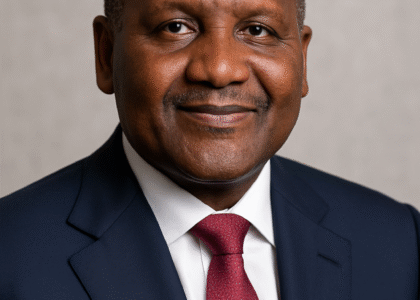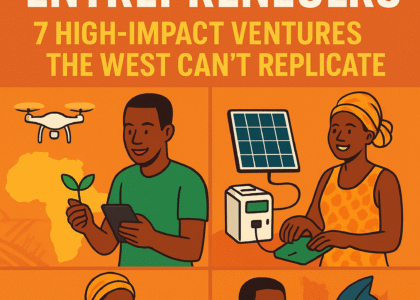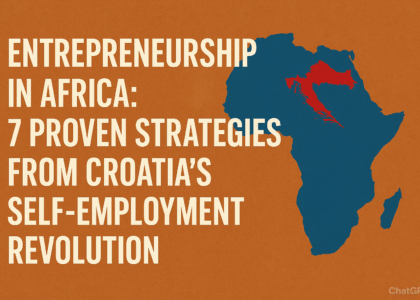—
Introduction: The Dream and the Dilemma
Africa is on the brink of a powerful economic transformation — one driven not by foreign aid or extraction, but by entrepreneurship, innovation, and youth ingenuity. From fintech in Lagos to agritech in Nairobi and creative industries in Johannesburg, the continent is brimming with potential.
But there’s a painful truth we can’t ignore: no economy can grow where life and property are unsafe.
Recently, former U.S. President Donald Trump reportedly directed the U.S. military to prepare for possible intervention if the Nigerian government fails to contain rising insecurity. source
This development, whether symbolic or strategic, underscores a harsh reality — the world is watching Africa’s internal instability.
And unless Africa takes charge of its security, its entrepreneurial revolution could crumble before it truly begins.
—
1. Why Security Is the Foundation of Entrepreneurship
Entrepreneurship thrives in environments where:
People can travel freely to do business.
Goods and services move safely through supply chains.
Investors trust that their capital is protected.
Innovation can flourish without fear.
In Africa, however, insecurity — from terrorism and kidnapping to cybercrime and regional conflict — continues to paralyze growth.
A young entrepreneur in northern Nigeria might have a brilliant agritech idea, but if bandits control major trade routes, innovation stops before it starts.
According to the World Bank, countries with high security indexes attract over 60% more foreign direct investment (FDI) than unstable nations.
—
2. Nigeria: The Heartbeat of African Entrepreneurship Under Threat
Nigeria stands as Africa’s largest economy and one of its most vibrant entrepreneurial hubs. Its youth drives global fintech unicorns like Flutterwave, Paystack, and Interswitch.
Yet, rising insecurity — insurgency, kidnappings, and communal clashes — threatens to undo decades of progress.
Entrepreneurs are forced to operate under fear:
Delivery businesses can’t ensure driver safety.
Tech hubs in volatile regions close down.
Investors redirect funds to safer countries like Kenya or Ghana.
The message is clear: where safety fails, startups flee.
—
3. Trump’s Reported Directive: What It Means for Africa
Donald Trump’s alleged military warning to Nigeria may stir controversy, but it also sends a signal — global powers are losing patience with Africa’s inability to guarantee basic security.
While some view foreign intervention as neo-colonial, others see it as a call for accountability. Either way, African leaders must act decisively to restore faith in governance and protect their citizens.
Because when governments fail to secure their people, foreign powers will shape the narrative — and the consequences.
—
4. The Cost of Insecurity on Economic Growth
Every act of violence drains billions from Africa’s economy.
The African Development Bank estimates that countries affected by conflict lose up to 30% of their GDP potential each year. Without peace, there is no progress.
1. Loss of Human Capital: Skilled professionals migrate in search of safety.
2. Decline in Foreign Investment: Investors avoid unstable environments.
3. Interrupted Infrastructure Projects: Construction, mining, and energy projects stall.
4. Reduced Consumer Confidence: Citizens spend less when they fear instability.
5. Innovation Drain: Talented youth abandon startups for safety abroad.
Simply put, every bullet fired in insecurity kills a business dream somewhere in Africa.
—
5. The Way Forward: Building a Secure Path to Prosperity
To unlock Africa’s full potential, leaders must balance entrepreneurial support with strong security frameworks.
Here’s what can help:
Public-Private Security Partnerships: Businesses collaborate with law enforcement to safeguard economic zones.
Investment in Technology: Use of AI, drones, and surveillance to monitor high-risk regions.
Empowerment Through Education: Engaging communities in peace-building and early conflict detection.
Leadership Accountability: Security should be treated as economic policy, not just defense strategy.
Africa doesn’t need to wait for international help. It needs visionary leadership and citizen participation.
—
Conclusion: You Can’t Build Wealth in Fear
Entrepreneurship remains the backbone of Africa’s transformation. But the dream will remain incomplete if insecurity continues to rob the continent of peace and potential.
The message to African leaders is simple:
 Protect your people, and the economy will protect itself.
Protect your people, and the economy will protect itself.
As the world’s attention turns to Nigeria, it’s time for decisive action — not just against insecurity, but for the future of African innovation.
—
Frequently Asked Questions (FAQ)
1. Why is security critical for Africa’s entrepreneurship?
Innovation, investment, and business operations rely on safety. Without it, entrepreneurs can’t operate efficiently or attract investors.
2. What does Donald Trump’s directive mean for Nigeria?
It signals international concern about Nigeria’s worsening insecurity and pressures African leaders to take stronger domestic action.
3. How does insecurity affect startups in Africa?
Insecurity limits mobility, scares investors, interrupts operations, and pushes talented youth to relocate abroad.
4. What can African governments do to improve security?
Invest in community policing, technology, intelligence sharing, and transparent governance. Engage the private sector in building safer economic zones.
5. Can Africa achieve economic growth without foreign intervention?
Yes — if leaders prioritize security, create a favorable business climate, and empower entrepreneurs to innovate freely.
—





